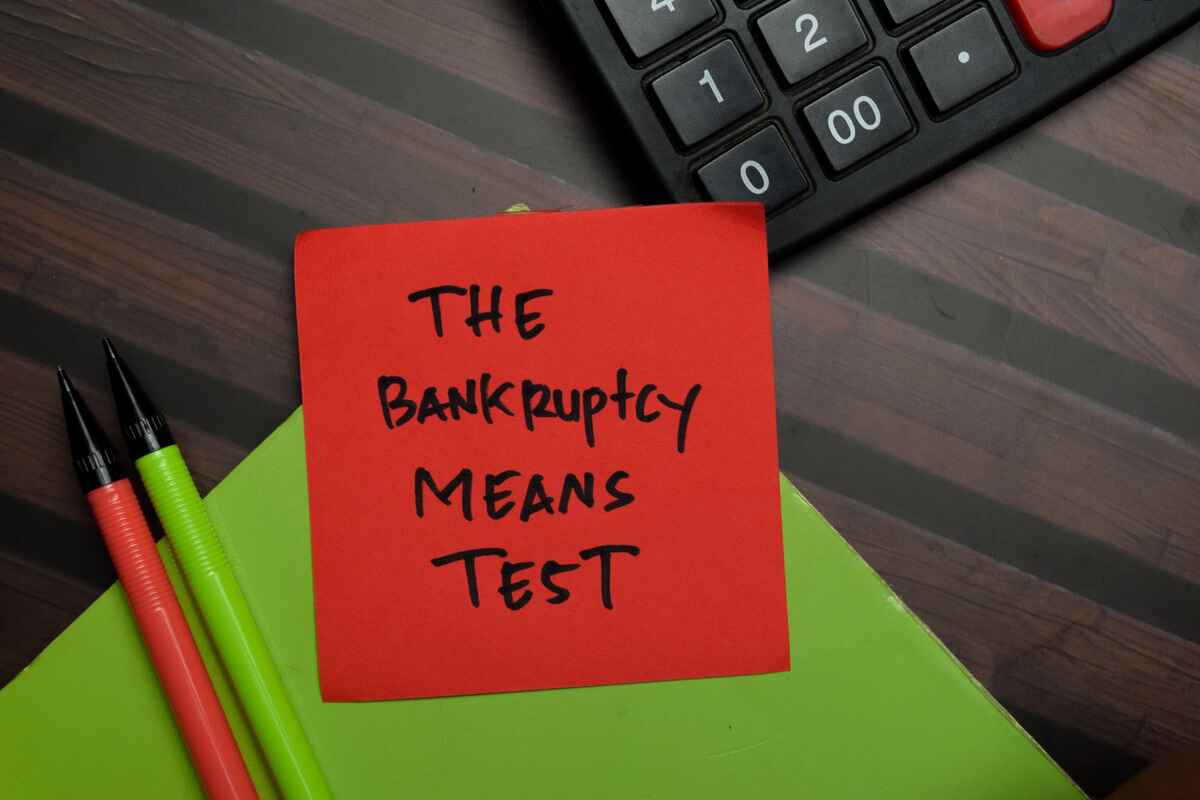Filing for bankruptcy can bring much needed financial relief to those drowning in debt. But bankruptcy is not a one size fits all solution, and there are different types of bankruptcy that individuals can file. The most common are Chapter 7 and Chapter 13 and the bankruptcy means test plays a big role in determining which one is available to debtors. In Nebraska, as in other states, the means test is used to filter out those who may have enough disposable income to pay off some of their debts and therefore are not eligible for Chapter 7 bankruptcy. This article will walk you through the Nebraska bankruptcy means test so you can understand the process and its importance in debt relief.
What is the Bankruptcy Means Test?
The bankruptcy means test is used to determine if you qualify for Chapter 7 bankruptcy which is the most straightforward type of bankruptcy and typically involves selling off assets to pay creditors. If you don’t qualify for Chapter 7 you can still file Chapter 13 which involves restructuring debt into monthly payments.
The means test was introduced under the Bankruptcy Abuse Prevention and Consumer Protection Act of 2005 (BAPCPA). Its purpose is to prevent abuse of the bankruptcy system by making sure only those who truly can’t afford to pay their debts qualify for Chapter 7. Those who have higher income and can afford to pay some of their debts are directed to Chapter 13.
The means test is a two part calculation. First it compares the debtor’s income to the median income in their state. Second it looks at the individual’s disposable income after allowed expenses to see if they can pay off some of their debts.
Why Does Nebraska Use the Means Test?
Nebraska uses the means test to make the bankruptcy process fair and equitable. The federal BAPCPA law requires all states to use the means test to reduce bankruptcy fraud and abuse. Before BAPCPA higher income individuals could file Chapter 7 and wipe out their debts without a thorough analysis of their financial situation. Now the means test makes those with disposable income pay back some portion of what they owe through Chapter 13 and leaves Chapter 7 for those who are truly insolvent.
For Nebraskans, the means test is a safety net to make sure bankruptcy is not taken lightly and only those who need Chapter 7 relief can get it.
Get A Free Bankruptcy Evaluation Today
Call (402) 965-0775 or (308) 221-8222 or click here to submit a consultation request form now.
Get Help Now
Nebraska Median Income
One of the components of the bankruptcy means test is comparing the debtor’s income to the median income in Nebraska. Median income is a threshold figure that is the middle of the income distribution in the state. If your income is below the median you will pass the means test automatically and qualify for Chapter 7 bankruptcy. If your income is above the state median further calculations are required to determine your eligibility.
For the purposes of the means test income includes wages, salaries, business income, rental income, pensions and other income. Note this is all household income not just the income of the individual filing for bankruptcy.
The median income thresholds in Nebraska vary by household size. As of recent data the median income for a single person household in Nebraska is around $60,000 per year and for a family of four is around $90,000. These figures change periodically based on local economic conditions and income trends so be sure to check the current figures when filing.
The Two Part Nebraska Bankruptcy Means Test
The means test is a two step process: comparing your income to the state median and calculating your disposable income.
Step 1: Compare Your Income to the Nebraska Median
To complete the means test you first need to calculate your current monthly income (CMI). This is your total income over the six months prior to filing for bankruptcy. If your income is below the Nebraska median for your household size you pass the means test and can file Chapter 7.
If your income is above the Nebraska median you move on to the second step of the means test. This is important for higher income earners as it determines how much of their disposable income can be used for debt repayment.
Step 2: Disposable Income Calculation
Disposable income is the income you have left over after accounting for necessary living expenses. The means test allows for certain “allowed expenses” which are deducted from your income to calculate how much disposable income is left. These expenses include basic needs such as housing, utilities, food, healthcare and transportation. The test uses the Internal Revenue Service (IRS) standards to determine reasonable expenses in each category but there is some flexibility depending on individual circumstances.
Once your disposable income is calculated the result will determine your eligibility for Chapter 7. If your disposable income is low enough that you can’t pay back you will qualify for Chapter 7. If your disposable income is high enough to pay back some of your debts you will need to file Chapter 13 which is a repayment plan.
Nebraska Exemptions in the Means Test
Nebraska has its own set of bankruptcy exemptions which protect certain assets from being taken and sold off to creditors. These exemptions don’t directly affect the means test but are important in determining how much property you can keep if you file for bankruptcy.
One of the Nebraska exemptions is the Homestead Exemption which allows homeowners to protect up to $120,000 of equity in their primary residence. This can be a big deal in bankruptcy cases especially for those in rural areas where property values are lower.
Other Nebraska exemptions include motor vehicles, retirement accounts and certain personal property. These exemptions allow filers to keep essential assets while going through the bankruptcy process.
If I Fail the Means Test in Nebraska?
If you don’t pass the means test it doesn’t mean you can’t file for bankruptcy at all. Instead you will likely have to file Chapter 13 bankruptcy. Chapter 13 is different from Chapter 7 in that it is a repayment plan where you will pay back a portion of your debts over 3-5 years based on your disposable income.
Chapter 13 is more complex and requires ongoing payments but it has its benefits. For example you can keep your home and other significant assets that would be sold off under Chapter 7. It also gives you a structured way to manage debt without the immediate pressure of creditor collections.
In some cases if your financial situation changes – such as a reduction in income or a big increase in allowed expenses – you may be able to re-take the means test to see if you can qualify for Chapter 7 later.
Get A Free Bankruptcy Evaluation Today
Call (402) 965-0775 or (308) 221-8222 or click here to submit a consultation request form now.
Get Help Now
Nebraska Specifics
There are a few things that are unique to Nebraskans. For example Nebraska’s agricultural economy means some individuals may have seasonal or variable income which can complicate the income calculation. Also the cost of living in Nebraska varies greatly between rural and urban areas which can impact the allowed expenses in the means test.
Family farms, small businesses and self-employment are more common in Nebraska than many other states and can add complexity to the means test and bankruptcy process. It’s highly recommended to consult a bankruptcy attorney who knows Nebraska’s economy if you’re considering filing.
How to Prepare for the Nebraska Means Test
Preparing for the means test involves gathering financial records and making sure all sources of income and expenses are documented. Work with a qualified bankruptcy attorney who knows Nebraska law.
Some of the key steps are:
- Calculate your current monthly income (CMI) based on the last 6 months.
- Document all allowed expenses – housing, transportation, healthcare.
- Review Nebraska exemptions to see what assets you can protect.
- Consult a professional to go over your options and make sure the means test is applied correctly to your case.
Means Test Mistakes
One of the biggest mistakes in the means test is not reporting all sources of income or misclassifying certain types of income. Underreporting your income can cause complications in your case and in some cases can even lead to bankruptcy fraud allegations.
Another mistake is misinterpreting allowed expenses. Many people assume all of their living expenses will be deducted but the IRS guidelines are strict in certain areas such as food and clothing. Miscalculating your disposable income can mean you fail the means test when you might otherwise qualify.
Finally, be accurate and transparent with all financial information. Bankruptcy trustees will review your case thoroughly and any discrepancies can cause delays, additional scrutiny or dismissal of your case.
Get A Free Bankruptcy Evaluation Today
Call (402) 965-0775 or (308) 221-8222 or click here to submit a consultation request form now.
Get Help Now
Summary
The means test is a big part of the bankruptcy process in Nebraska to make sure only those who really need Chapter 7 bankruptcy are eligible for it. While the test may seem confusing, understanding the basics and Nebraska’s laws and exemptions will help you make informed decisions about your future.
For Nebraskans thinking of filing bankruptcy, consult a qualified attorney. The means test is tricky but with the right guidance you can get a fresh start and protect the assets you need to move forward.



